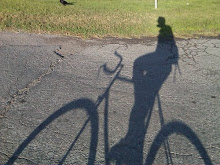A recent op-ed by renowned conservative intellectual, David Brooks,
I Dream of Denver has been bouncing around the net and making a big stir within the planning community. He basically states that planners have their heads in the clouds when it comes to reshaping the way Americans live and how our cities and communities operate and relate to one another. According to Brooks, the current downturn in the development industry is only temporary and that once the good old American economy is back up and running, Americans will continue to move farther away from urban cores to the exurbs.
I guess this is a good time to write a brief statement of my beliefs regarding planning and why I have chosen to give up my car... most of which opposes Brooks' point of view.
It is true that as a future planner I would like to see American cities revitalized and become livable and walkable environments. Why? Because I believe that as a nation we have to change the way that we live and interact with one another and our environment for the future vitality of our country. We can't go on expanding suburbia ever outward, there aren't the resources, the oil isn't there to allow use to continue to increase our driving and our society can't take the pressure that sitting in a tin-can for three hours a day does to a person. Do we really want to pave over every acre of farm land, or meadow, or rid ourselves of the charms of small towns and replace these things with the monotony of cul-de-sacs and strip malls?
Not only is suburbia an aesthetic and culture sink hole, but the economics can't last. I know the American economy is built upon the ever expanding binge-consumption of useless plastic crap, but for the health of ourselves, our communities, and our environment we need to consume and want less. Its a difficult transition to make, because almost everything in our American culture tells us that consumption is good, your not a good American if you don't consume. Our last president even told us that the most patriotic thing, as Americans, that we could do was to go to the mall.
The car and the physical infrastructure that is required to maintain the aoutocentric, mobile lifestyle of Americans is becoming to big, to destructive, and to costly. Living a life in which alternative transportation plays a large part consumes less, pollutes less, costs less, and has the added benefit of allowing face-to-face interactions with those individuals that you call neighbors. We need community right now, to get use through tough times, and that can't be fostered sitting in a car competing for lane space.
 Today I installed and tested a new toy for my bike. Like a pedometer, the Cateye Micro Wireless device (approx. $30) records trip information for cyclists. It can record and display trip length, current and average speed, trip time, and even has an odometer to keep track of total millage.
Today I installed and tested a new toy for my bike. Like a pedometer, the Cateye Micro Wireless device (approx. $30) records trip information for cyclists. It can record and display trip length, current and average speed, trip time, and even has an odometer to keep track of total millage. 